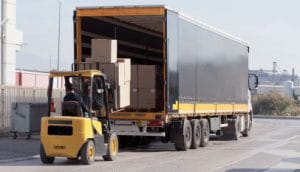Working with a certified freight broker can be confusing. Especially when acronyms like FTL and LTL are common across the internet. However, once you understand the differences between the two types of shipping, you can make the right choice for your needs. Both full truckload (FTL) and less than truckload (LTL) are acronyms that refer to freight shipping by volume. Choosing the right type of freight shipping method is important and can mean differences in freight delivery time and shipping rates. Working with our team at All America Transportation means you can choose the right freight shipping method for your needs. Our St. Louis experts will work with you to determine the amount of freight cargo you have and which method will work best.

Less than truckload freight shipping is when multiple shippers have cargo on the same truck trailer. It is a method of freight shipping in which the shipping costs are shared among the shippers. Several LTL shipments can be combined into one trailer to fill it to capacity. LTL freight shipping is a great option that is between one and six pallets or any shipment that is less than 14 linear feet. It makes the most out of the available space on a trailer.
Full truckload freight shipping is when one shipper has a large shipment that requires a full trailer. With FTL shipping, your freight is the only cargo on the trailer. This helps to avoid freight handoffs and delays due to multiple stops. You can rent a full trailer even if you do not have a completely full truckload.
One of the biggest differences between LTL and FTL shipping, aside from the quantity of cargo, is the cost savings that LTL gives you. When you only ship a few pallets, it is cheaper because you are only paying for the space you are using. LTL Carriers like our team at All America Transportation have to maintain efficiency by filling the excess space with other shipments. This allows LTL shipments to maximize the available space on the trucks.
Another difference between LTL and FTL shipments is overall pickup and delivery times. Full truckload shipments will pick up your cargo and drive it straight to the receiver. This one-stop option allows for expedited shipping times and fewer delays. However, less than truckload shipments do not go directly to the receiver. Because of the nature of shared trailer space, the truck may make several stops before reaching the final destination for your freight.
FTL carriers can offer firm delivery times and expedited shipping for full truckloads since they are only carrying freight from one source. Since LTL shipments pick up and deliver freight from multiple locations, their pick-up and drop-off times often have a wider window and may require more flexibility.
LTL shipments also have increased handling and exposure times. This is because your freight may be loaded and unloaded several times as the truck makes several stops to unload other cargo. It increases the chance of damage, especially if your freight is sensitive or fragile.
Understanding the differences between full truckload and less than truckload shipments is important. It can give you some insight into what options work best for your shipments. However, choosing the best method can still be very complicated. Working with a certified freight broker like our team at All America Transportation can simplify the selection process for your logistics operations. Our experts will work with you to determine your freight shipping needs and help you choose whether FTL or LTL is better for your particular needs. We specialize in supply chain management and ensure that our shipments arrive on time. Certified freight brokers provide an advantage for businesses looking to find competitive rates in the market, along with freight services they can count on. You get expertise, cost savings, and visibility into your shipments and their handling.
If you are looking for a certified freight broker to help manage your freight shipments, we can help. Our team at All America Transportation offers professional logistics consulting and competitive freight shipping quotes. Contact our team today by calling 888-343-6806 or by filling out our freight quote form.